
Measure 16 of 1994 established the U.S. state of Oregon's Death with Dignity Act, which legalizes medical aid in dying with certain restrictions. Passage of this initiative made Oregon the first U.S. state and one of the first jurisdictions in the world to permit some terminally ill patients to determine the time of their own death.
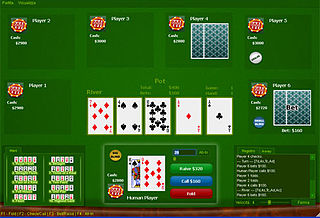
Online gambling is any kind of gambling conducted on the internet. This includes virtual poker, casinos, and sports betting. The first online gambling venue opened to the general public was ticketing for the Liechtenstein International Lottery in October 1994. Today, the market is worth around $40 billion globally each year, according to various estimates.
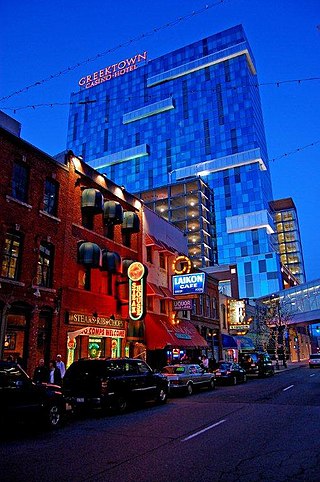
Hollywood Casino at Greektown, formerly Greektown Casino-Hotel, is a casino hotel in the Greektown neighborhood in Detroit, Michigan. It is owned by Vici Properties and operated by Penn Entertainment.

The Indian Gaming Regulatory Act is a 1988 United States federal law that establishes the jurisdictional framework that governs Indian gaming. There was no federal gaming structure before this act. The stated purposes of the act include providing a legislative basis for the operation/regulation of Indian gaming, protecting gaming as a means of generating revenue for the tribes, encouraging economic development of these tribes, and protecting the enterprises from negative influences. The law established the National Indian Gaming Commission and gave it a regulatory mandate. The law also delegated new authority to the U.S. Department of the Interior and created new federal offenses, giving the U.S. Department of Justice authority to prosecute them.

In the United States, gambling is subject to a variety of legal restrictions. In 2008, gambling activities generated gross revenues of $92.27 billion in the United States.

Elections in Michigan are held to fill various local, state and federal seats. Special elections may be held to fill vacancies at other points in time.
The politics of Michigan, currently a true swing state in presidential elections, are closely contested. Until 2016, Michigan was considered part of the Democrats' "Blue Wall." Governors since the 1970s have alternated between the two parties, and statewide offices including attorney general, secretary of state, and senator have been held by members of both parties in varying proportions, though the state currently is represented by two Democratic U.S. Senators and Democrats hold every statewide office. The Michigan Legislature is currently split between the two parties, with Democrats holding a 20-18 majority in the Senate and the Republicans holding a 58-52 majority in the House of Representatives. The state's congressional delegation is commonly split, with one party or the other typically holding a narrow majority: Republicans currently have a 7-6 majority, in the ongoing 119th Congress.
Indiana law authorizes ten land-based or riverboat casinos on Lake Michigan and the Ohio River, one land-based casino in French Lick, and racinos at the state's two horse tracks. In addition, there is one Indian casino in the state. Other forms of legal gambling are the Hoosier Lottery, parimutuel wagering on horse races, and sports betting.
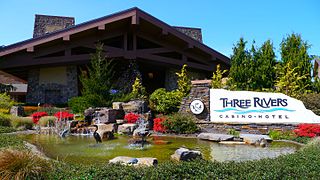
Gambling in Oregon relates to the laws, regulations, and authorized forms of gambling.
Gambling in Pennsylvania includes casino gambling, the Pennsylvania Lottery, horse racing, bingo, and small games of chance conducted by nonprofit organizations and taverns under limited circumstances. Although casino gaming has been legal for less than two decades, Pennsylvania is second only to Nevada in commercial casino revenues.
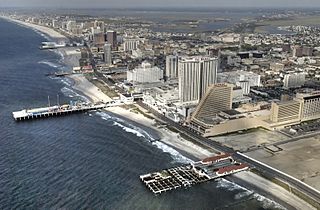
Gambling in New Jersey includes casino gambling in Atlantic City, the New Jersey Lottery, horse racing, off-track betting, charity gambling, amusement games, and social gambling. New Jersey's gambling laws are among the least restrictive in the United States. In 2013, the state began to allow in-state online gambling. Five years later in 2018, the state won a lawsuit that dismantled Nevada's monopoly on legal sports betting.
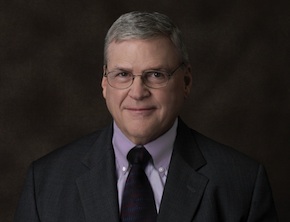
Richard D. McLellan is a lawyer at McLellan Law Offices PLLC. He has served as Chairman of the Michigan Law Revision Commission since 1986. He argued on the side of the appellee in the United States Supreme Court case Austin v. Michigan Chamber of Commerce, 494 U.S. 652 (1990).
Legal forms of gambling in the U.S. state of North Carolina include the North Carolina Education Lottery, three Indian casinos, charitable bingo and raffles, and low-stakes "beach bingo". North Carolina has long resisted expansion of gambling, owing to its conservative Bible Belt culture.

The Regional Transit Authority of Southeast Michigan (RTA) is a public transit agency serving Metro Detroit and the Ann Arbor area in the U.S. state of Michigan. It operates the QLINE streetcar in Detroit, and coordinates and oversees the public transit services operated by DDOT, SMART, TheRide, and the Detroit People Mover. Its operating area covers the counties of Macomb, Oakland, Washtenaw, and Wayne.

In California state elections, 2014 was the first year in which the top statewide offices were elected under the nonpartisan blanket primary, pursuant to Proposition 14, which passed with 53% voter approval in June 2010. Under this system, which first went into effect during the 2012 election year, all candidates appear on the same ballot, regardless of party. In the primary, voters may vote for any candidate, regardless of their party affiliation. The top two finishers, regardless of party, then advance to face each other in the general election in November.

2015 Michigan Proposal 1, also known as the Michigan Sales Tax Increase for Transportation Amendment, was a referendum held on May 5, 2015, concerning a legislatively-referred ballot measure. The measure's approval would have caused one constitutional amendment and 10 statutes to go into effect. It is estimated that Proposal 1 would raise state revenues from sales and use taxes by $1.427 billion, fuel taxes by $463 million, truck registration fees by $50 million, and vehicle registration fees by $10.1 million in the first year. If approved, the proposal was estimated by the Associated Press to result in an average tax increase of $545 per household in 2016.

The Michigan Gaming Control Board (MGCB) is a gaming control board in Michigan that provides oversight of the state's gaming industry, which was founded and authorized by statewide voting in November 1996.

Legal forms of gambling in the U.S. state of California include cardrooms, Indian casinos, the California State Lottery, parimutuel wagering on horse racing, and charitable gaming. Commercial casino-style gaming is prohibited.
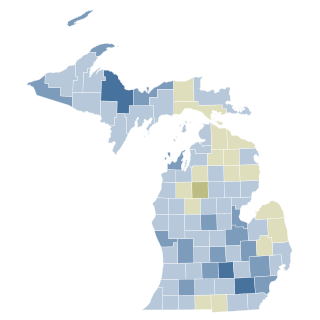
Michigan Proposal 18-2 was a ballot initiative approved by voters in Michigan as part of the 2018 United States elections. The proposal was created in preparation of the 2020 United States Census, to move control of redistricting from the state legislature to an independent commission. The commission consists of thirteen members selected randomly by the secretary of state: four affiliated with Democrats, four affiliated with Republicans, and five independents. Any Michigan voter can apply to be a commissioner, as long as they have not been, in the last six years, a politician or lobbyist. Proponents argued that Michigan's current districts are gerrymandered, giving an unfair advantage to the Republican Party. Opponents argued that the process would give the secretary of state too much power over redistricting, and that the people on the commission would be unlikely to understand principles of redistricting. The proposal was approved with 61.28% of the vote.
















